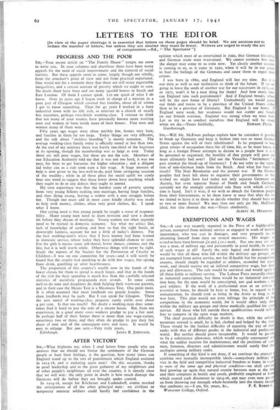EXEMPTIONS AND WAGES
Sm,—A case was recently reported in the Press of a highly-skilled artisan, exempted from military service as engaged in work of national importance, who was cast in damages, and very properly so, In
absenting himself from duty_ several occasions. His wages arc stated to have been between £9 and L lo a week. But one may asle was a man, of military age and presumably in good health, in receipt of such wages at all? Surely the only logical and democratic rule would be that all those who fall within the military age groups, and are exempted from active service, not for ill-health but for occupational reasons, should simply be regarded as soldiers, seconded for special work, and should receive not an inflated competitive wage, but Anal pay and allowances. The rule would be universal and would apply IS all those liable to military service. The Labour Party naturally object to industrial conscription, but there would be no industrial consent)• tion here, for the men would be conscripted, not qua workme-t, b quit soldiers. If the work of a professional man or an artisan essential at home, he should be kept at home, but, in regard to b remuneration, he should rank as being in the Army as long as 1 war lasts. This plan would not even infringe the principle of fr competition in the economic world, for it would affect only th. within the military age groups and those medically qualified for actin service. All those who fall outside these qualifications would still free to compete in the open wage markets. The chief practical difficulty no doubt is that, while the soldier monetary reward is small, he is fed, clothed and lodged by the Stale There would be the further difficulty of equating the pay of Ano ranks with that of different grades in the industrial and professio world. But neither should prove insuperable. It would be possil to fix a subsistence allowance, which would roughly correspond wi what the soldier receives for maintenance; and the positions of work men, foremen, directors and administrators would surely find th analogies among military ranks.
If something of this kind is not done, if we continue the attempt combine two mutually incompatible ideals—compulsory military set vice in the field and competitive industrial freedom at home in rcg to men of the same age and physical condition—we shall certai fmd growing up again that natural enmity between men at the f and their compeers in health and youth, profitably employed at ho which caused such discontent in 1914-18, and may even now prey us from throwing our strength whole-heartedly into the titanic stn.'






























 Previous page
Previous page